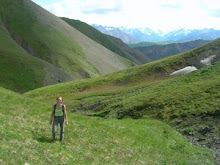I have a friend who is truly, deeply devoted to young adult fiction. It’s a genre I don’t spend much time with anymore, but I do have a section on one of my favorite bookshelves that contains some of the literature that I read as a child, books that I now turn to for comfort when life shakes me up and tosses me down. Very little is more soothing to me than revisiting these old friends, these chapters from a distant past before I knew heartbreak and other adult pains, these books that I have read so many times that I literally know every word, every turn of phrase and cadence of sentence. They don’t ask me to analyze them or apply them to my own life, because they’re about a part of me that was dissolved into my present self nearly two decades ago, but sometimes I end up applying them anyway. Sometimes I learn a lot more than I expect from them.
Right now, my life is in transition. My relationship has ended, sadly and painfully, and in the wake of its passing I’m being forced to confront myself again as a person alone. While I know that this re-centering is part of the natural course of recovery, it is also undeniably painful and difficult. As I huddle around myself, quiet and contemplative and careful and mostly patient, I’m revisiting some of these old and beloved volumes to see what they have to offer to the me of now. Some of these books have been a part of me for so long that reading them feels like a warm blanket drawn around me, a cocoon where I can rest, a place where no surprises are in the offing. It is deeply comforting. I bought The Facts and Fictions of Minna Pratt, a young adult novel by Patricia MacLachlan (also the author of the vastly more famous Sarah Plain and Tall) when I was probably twelve or thirteen, just slightly older than Minna herself, and my copy is now so old that the pages are a brownish yellow. In content it’s a simple book: Minna, an eleven-year-old cellist playing in a local music school’s chamber group, struggles with the first pangs of love while also navigating the difficulties of playing a Mozart string quartet. I myself began playing chamber music when I was about sixteen, probably in part because of Minna, and my first clear quartet memory is of the piece that she learns with her group, Mozart’s K. 157. The slow movement that is Minna’s nemesis is one of my favorites, a slow melancholy moment set in the middle of two effusively joyous movements.
Chamber music, in contrast to the bombast that surrounds an orchestral musician, is a quiet discussion in the corner of a room, a dedicated expression of individual but congruent thought. Part of why I love this book is because the writing is like that, a quiet conversation where simple gestures are imbued with great meaning and value—much like Mozart’s music, in fact. When I read it I’m carried back to my own adolescence when so much of what was happening to me was happening for the first time, shiny and alien, simple but oh so complicated. At the time it was confusing and sometimes terrifying, but now I wish that I could have better savored the freshness of those moments, the newness of what I was feeling. The first time somebody took my hand, the first time I felt my heart tighten at the appearance of another, the first time I fell under the thrall of art or beauty or love: these things are so simple and yet even now, when I’ve experienced them often enough that I sometimes think I should feel more jaded, they astonish.
Minna’s beloved is Lucas, the violist in her quartet. (Of course…) The slow journey they take from first meeting to final page is familiar, but their perspectives from within what is so brand new casts me back into my younger self. When Lucas rests his hand on the back of Minna’s neck three-quarters of the way through the book, nearly the only physical contact they share—no description of a first kiss or even handholding, really—my breath catches. (The contact is barely acknowledged in the text, which somehow makes it seem even more perfect.) Is anything like that, the first touch of a beloved’s hand? Not just the first time with a specific beloved, but the first time with any beloved? Is there anything that will ever feel again like my first brush with Mozart, when I understood so little of what was going on beyond the joy of crescendoing through a series of rising notes in perfect unison with the cellist sitting beside me? Can I see these things again without looking out from beneath the collective weight of all their predecessors?
But now feels like the time for seeing old things as new again. In very tangible ways I’m starting over, and what I want is to see things in connection to their past incarnations but also as singular moments, as containing individuality as well as referential meaning. I need my present self to have an identity beyond my past self, even if they are working together to make me who I am. I want a new day, and I’m waiting patiently until it appears.
Subscribe to:
Post Comments (Atom)







4 comments:
oof. such a beautiful meditation. your sentences are gorgeous, Ammie. Coming back to your blog is always treat for the senses.
I'm with ShanaRose; your sentences are gorgeous beyond words. It makes me wistful at times because I have lost touch with navel-gazing and pouring those thoughts into a blog. Soon.
*hugs*
wow. yes.
i should have read this weeks ago.
كشف تسرب المياه
شركة كشف تسربات المياه
شركة كشف تسرب المياه
Post a Comment